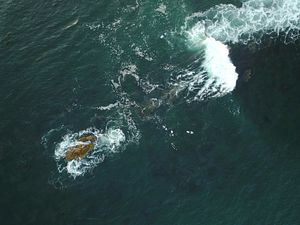This week Indonesia is hosting the fifth annual Our Ocean conference on the island of Bali. The conference series was initially created by the U.S. Department of State in order to increase the collaboration and partnerships among states with major ocean interests. The first conference was held in Washington, D.C in 2014, and since then the conference has generated spending commitments totaling close to $18 billion dollars and help designate 12.4 million square kilometers of marine protected areas.
The agenda of this year’s conference remains committed to ensuring further marine protection, while also focusing on mitigation measures for the effects of climate change, sustainable fishing practices, the reduction of ocean pollution, issues of maritime security, and the promotion of sustainable economic activity.
The establishment of global institutions focused on the welfare of the planet’s oceans is a major diplomatic victory for Pacific Island states. In addition to this week’s Our Ocean conference in Bali, the United Nations Oceans Conference in 2017, held in New York and co-hosted by Fiji and Sweden stands as an achievement. Both these institutions highlight an increasingly global recognition of issues that are at the core of Pacific Islands’ concerns.
While it would be overstating their influence to suggest that these new multilateral initiatives focused on ocean welfare are the sole outcome of Pacific diplomatic activity, it would be also be remiss to underestimate their influence. In recent years Pacific Island states have developed a much more assertive diplomatic posture, becoming highly active in promoting agendas that are vital to their interests, and using the weight of their votes to try and shape the issues that the UN and other multilateral forums deal with.
The primary driver of this heightened diplomatic activity has been Fiji’s Prime Minister Frank Bainimarama. Feeling alienated from regional structures that relied too heavily on Australian and New Zealand acquiesce, Bainimarama took the position that not only should the Pacific be better organized in its global diplomacy, but Fiji should take on a role as the hub of the Pacific, and use this position to gather together overlapping Pacific concerns, agendas, and voices for a more collective diplomatic mission. This would involve more active participation in global multilateral forums, increased south-south cooperation, and attempting to pivot regional frameworks like the Pacific Island Forum (PIF) to be driven by Pacific Island concerns that Canberra and Wellington should respond to, rather than vice versa.
This more active diplomatic posture has not simply been the case of Pacific Island states pursuing their interests with greater ambition, but also involves a bold new conceptual framework that seeks to reframe how Pacific Island states are perceived and engaged with by the rest of the world. The concept of the “Blue Pacific” is an attempt to reposition Pacific Island countries as “large ocean states,” rather than “small island states.” Most Pacific Island countries have Exclusive Economic Zones (EEZs) that cover vast swaths of the Pacific ocean, collectively making them the dominant custodians of the region’s marine life and ocean health. This provides these countries with a perspective toward the oceans that other states may lack.
The defining outline of the Blue Pacific concept was a speech delivered by Samoan Prime Minister Tuilaepa Sailele at the UN Oceans Conference in New York in June 2017, titled “Our Values and Identity as Stewards of the World’s Largest Oceanic Continent.” In this speech, Sailele outlined how the Pacific Ocean is core to the region’s way of life and how it has shaped the cultural and historical identity of these nations, creating an “inseparable link between our ocean, seas, and Pacific Island peoples: their values, traditional practices and spiritual connections.” Sailele expressed how Pacific Islanders feel a guardianship toward the ocean, and their leadership on issues related to it should to be respected.
Sailele used the speech to outline the various agreements, policies, and plans that Pacific Island states have formulated over the years to govern the Pacific marine environment, especially highlighting the Rarotonga Nuclear Free Treaty in 1985. While these actions may have been historical, they demonstrate the responsibility Pacific Island states have traditionally felt toward the ocean, and provide a background to the new, more solidly identified conceptual framework of the Blue Pacific. This framework seeks to submit all policymaking to an understanding of the region’s “ocean identity,” “ocean geography,” and “ocean resources.”
Therefore, for Pacific Island states the creation of ocean-centric conferences — like this week’s Our Ocean conference — is an opportunity not only to advance agendas that are vital to their national interest, but also for other states to call upon their expertise. Not all countries are so dominated by their relationship with the ocean as those in the Pacific, and this provides Pacific Island countries with experience and perspectives that are vital to understanding the importance of oceans in maintaining the world’s environmental harmony, and the tools necessary to approach greater ocean preservation.

































